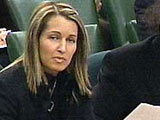 It has been a strange December with respect to battles over the custody of children involving both Canadian and American jurisdictions. First, Myriam Bedard has been in the news for weeks for having abducted her 12 year old daughter, Maude, her arrest in the United States on an international warrant, and her continued detention in a Maryland jail.
It has been a strange December with respect to battles over the custody of children involving both Canadian and American jurisdictions. First, Myriam Bedard has been in the news for weeks for having abducted her 12 year old daughter, Maude, her arrest in the United States on an international warrant, and her continued detention in a Maryland jail.Now, a 49 year old American woman has been arrested in Ottawa for not returning her 17 month old twins to the couple in North Carolina who had adopted the twins at birth. The mother, Allison Lee Quets, had visitation rights as a custody battle following the adoption this year from December 22 to December 24th. Ms. Quets and the twins were discovered in Ottawa after Custom officials confirmed the place and time that she had crossed into Canada from the United States.
Ms. Quets now claims that she agreed to give up the twins under questionable circumstances. She says she had panicked and made the wrong choice because of her insecurities about adequately being able to take care of the babies, but changed her mind 12 hours after their birth. The parents adopting the children refused and a custody battle has emerged. Unlike many jurisdictions, the laws in North Carolina do not provide a grace period for mothers who plan to give up their children at birth to change their mind.
Orders of the court are the supreme measure of what is right and what is wrong in cases such as this. It is the same if the children involved were instead someone's property. However, because we are talking about children and not just property, should we consider whether the State also has an obligation to use some "common sense"?
In Canada and in the United States, family policy affects in some way close to 50% of the population. Most involved agree, family policy is cumbersome, inequitable and inaccessible, and also one of the most profitable areas of law for lawyers. This is in spite of the fact that decisions made in by an "inadequate system" directly affect the lives and futures of our society's children and their families.
Some argue that the current system is gender discriminatory: patriarchal principles that have been abandoned otherwise or are considered to be inappropriate in other aspects of life remain at the heart of policies surrounding custody, child support and child access.
From a policy perspective, a primary sign of a failed policy is when those who are served and affected by policy choose not to comply with it voluntarily. So, whether it is Ms. Quets who risks everything to be with her children, or a non-profit father's group who shuts down a bridge in Montreal (to protest fathers collectively not having appropriate access to their children), those who set the agenda should take note.
Since the 1990s changes to our family policies have been in the queue. Federal reports in 1998 and 2002 called for such change. What if those recommendations had been implemented? Is possible we could have avoided these situations? These are clear signs of failed family policy.
Of course, there are other priorities from year to year. And, special interests continue to profit from how the system is set up now. However, there comes a time when those setting the agenda need to consider what policies within their jurisdiction and responsibility are most acutely out of balance, and act on them for the sake of our striving to have a "just society".
I trust that by the end of 2007 we will be able to count on Canada being a more equitable and fair society because those setting the agenda will choose to do what is right for children, women and men from all types of families.










































